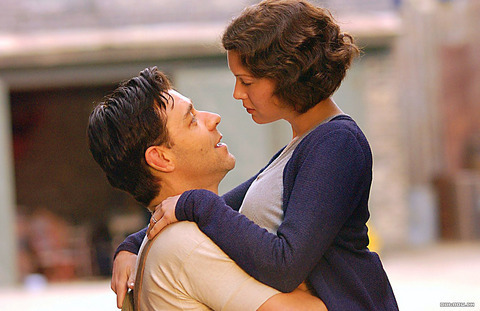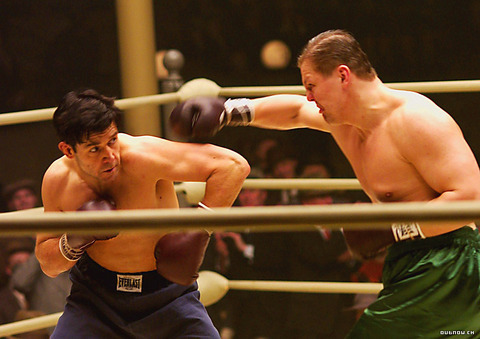On June 13, 1935, the boxer James J. Braddock fought the fight of a lifetime. Born in Hell's Kitchen when that New York neighborhood still warranted that rough-and-tumble epithet, the 30-year-old heavyweight was the son of immigrants whose bloodlines and hardscrabble woes traced back to Ireland. Said to have weighed more than 7.7kg at birth, the adult Braddock tipped the scales around 81.6kg, stood nearly 2.6m and was in the possession of a 190cm reach. His most famous opponent, the Livermore Larruper, Max Baer, had a 206cm reach, bringing him dauntingly close to Braddock's lopsided grin.
In Cinderella Man, his movie about Braddock and the fight of his life, the director Ron Howard brings you viscerally close to understanding how that sideways smile was almost erased. Played by Russell Crowe with moist eyes and restless animal vigor, the pugilist known as the Cinderella Man entered the ring against Baer (an excellent Craig Bierko) with the odds 10-to-1 against him. The story of how this well-regarded boxer down on his luck faced those odds is one of the most celebrated in American sport, so it's a wonder it has never before been told on-screen. Filled with ups and heartbreaking downs, it is a story that can put a lump in your throat, though given Howard's inclination toward hokum, a lump on which you might easily gag.
Howard begins his film with a quote from Damon Runyon, who bequeathed Braddock his fairy-tale nickname. (According to Jeremy Schaap's fast-moving book, also titled Cinderella Man, the fighter was more prosaically known as Irish Jim Braddock.) The Runyon quote constitutes the best writing in the film, which features a serviceable screenplay by Cliff Hollingsworth and the higher-profile Akiva Goldsman. Goldsman also wrote Howard's much-lauded, multiple Academy Award-winning film, A Beautiful Mind, a work similarly steeped in nostalgia and hooey, the latter exemplified by the image of Crowe corrugating his meaty brow to play a tormented math genius. Crowe, a vibrantly physical screen presence, looks far more persuasive slicked with sweat and slugging other men.

In 1928, the year Cinderella Man opens, Braddock seemed to have all the right moves. Then a light heavyweight, the boxer was young, supremely healthy and both talented enough and dumb enough to earn a good living with his fists. The Crash changed his fortune as well as his optimistic outlook, and thereafter Braddock entered an agonizing downward spiral. Within a few years, he and his wife, Mae, played in the film by Renee Zellweger as a sniffling, squinting Kewpie doll, were living in a basement apartment with their young children and trying to keep the wolf from the door. In 1934, when his manager, Joe Gould (Paul Giamatti), asked Braddock if he wanted a fight, the boxer was wielding a baling hook on the Jersey docks. Almost a year had passed since his last bout.
Like Gary Ross's Seabiscuit, the legend of the little Depression-era horse that could, Cinderella Man is a shamefully ingratiating old-fashioned weepie. To his credit, Howard does not wave the flag as vigorously as Ross, though the new film's tagline ("When America was on its knees, he brought us to our feet") prepares you for the worst. In any event, given that Howard and his writers would be hard-pressed to bend this underdog narrative to our current political nightmare, it's a good thing they don't venture down that path. And with this material, there really is no need. Lightly stained a nicotine brown and topped by two male actors who could steal a movie from a basket of mewling kittens and an army of rosy-cheeked orphans, the film is as calculating and glossy a hard-luck tale as any cooked up on the old M-G-M lot.
The Braddock and Baer match affords the film its climax, but it's the face-off between Crowe and Giamatti that gives it bite. Neither performer is at the top of his form here -- Crowe's crowning achievement remains The Insider, Giamatti's, unsurprisingly, is Sideways -- but they duet nicely. Crowe, his face more sharply beveled than it has been in years, plays Braddock as a reluctant warrior, a good guy who seems almost abashed to lead with his fists. The actor doesn't pump up the heroics, which would have been a poor fit for the unassuming Braddock, but breathes life into the Everyman that both the country and its sportswriters needed. Out of the ring and opposite Giamatti, Crowe eases into the boxer's soft side, at times beautifully; in the ring, he's repulsively believable.

PHOTOS: AFP
Giamatti does a lot of his acting with his eyebrows, which doesn't make the performance any less enjoyable. Gould was as much fixer as manager, and the actor makes you see the man's every angle as cleanly as if they were drawn with a ruler and compass. In his book, Schaap repeats one contemporary observer's theory that if Gould had been a better manager, Braddock would not have suffered so many career downturns. Howard and his collaborators don't test those particular murky waters, but they make sure we see boxing is an ugly game no matter how likable the players. In one of the most effective scenes, Gould frantically urges Braddock to break his opponent's nose and "fill his face with blood." This is a fight movie where the blood doesn't dribble.
With a killer of a sports story and two top-flight actors, Howard can't go terribly wrong. A fine craftsman, the director has in recent films been drawn to increasingly darker themes, perhaps because, in the age-old calculus of mainstream production, dark equals heft. In his last film, The Missing, a taut western pegged to the hoariest frontier cliche (white women kidnapped by marauding Indians), Howard employed a somber palette and let (or just watched) his two leads, Cate Blanchett and Tommy Lee Jones, cut loose. The director pretty much repeats the same formula here, aided by the same talented cinematographer he used for The Missing, Salvatore Totino, and his longtime editors Mike Hill and Dan Hanley, whose hard cutting intensifies the blunt force of every punch.
The fights are brutal, at times floridly so, and crucial to the film's own blunt force. Like some musical song-and-dance numbers, they break into the main storyline, providing much-needed relief from Braddock's gratingly soft-focus marriage. Taken together, the fights also create a leaner, meaner parallel narrative. One of the satisfactions of Cinderella Man is that, in the end, the story that unfolds inside the ring is not the same one that Howard, his screenwriters and the composer Thomas Newman seem keen to sell. Their Cinderella Man is the decent little guy who affirms what movie people call the triumph of the human spirit. The story Crowe tells, with Giamatti riding shotgun as a gleeful Mephistopheles, is that of a man who, having sampled the blood of others, clearly enjoyed the taste.

The canonical shot of an East Asian city is a night skyline studded with towering apartment and office buildings, bright with neon and plastic signage, a landscape of energy and modernity. Another classic image is the same city seen from above, in which identical apartment towers march across the city, spilling out over nearby geography, like stylized soldiers colonizing new territory in a board game. Densely populated dynamic conurbations of money, technological innovation and convenience, it is hard to see the cities of East Asia as what they truly are: necropolises. Why is this? The East Asian development model, with

June 16 to June 22 The following flyer appeared on the streets of Hsinchu on June 12, 1895: “Taipei has already fallen to the Japanese barbarians, who have brought great misery to our land and people. We heard that the Japanese occupiers will tax our gardens, our houses, our bodies, and even our chickens, dogs, cows and pigs. They wear their hair wild, carve their teeth, tattoo their foreheads, wear strange clothes and speak a strange language. How can we be ruled by such people?” Posted by civilian militia leader Wu Tang-hsing (吳湯興), it was a call to arms to retake

This is a deeply unsettling period in Taiwan. Uncertainties are everywhere while everyone waits for a small army of other shoes to drop on nearly every front. During challenging times, interesting political changes can happen, yet all three major political parties are beset with scandals, strife and self-inflicted wounds. As the ruling party, the Democratic Progressive Party (DPP) is held accountable for not only the challenges to the party, but also the nation. Taiwan is geopolitically and economically under threat. Domestically, the administration is under siege by the opposition-controlled legislature and growing discontent with what opponents characterize as arrogant, autocratic

When Lisa, 20, laces into her ultra-high heels for her shift at a strip club in Ukraine’s Kharkiv, she knows that aside from dancing, she will have to comfort traumatized soldiers. Since Russia’s 2022 invasion, exhausted troops are the main clientele of the Flash Dancers club in the center of the northeastern city, just 20 kilometers from Russian forces. For some customers, it provides an “escape” from the war, said Valerya Zavatska — a 25-year-old law graduate who runs the club with her mother, an ex-dancer. But many are not there just for the show. They “want to talk about what hurts,” she